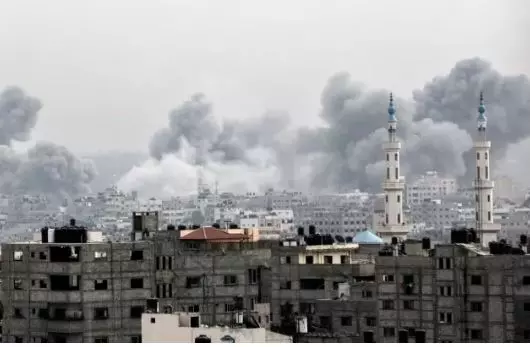
Netanyahu rejects ceasefire amid Hezbollah’s increased attacks on Israel's northern border
text_fieldsTel Aviv: Israeli Prime Minister Benjamin Netanyahu has rejected calls for a temporary ceasefire in the ongoing conflict with Gaza, asserting that Israel will continue its offensive "with full force."
The refusal comes despite urging from US Secretary of State Antony Blinken, who visited Israel to advocate for a pause in military operations to allow humanitarian aid into the territory.
The latest developments unfolded as a convoy of ambulances outside Gaza's largest hospital was struck by an airstrike, resulting in a tragic loss of life. The Gaza health ministry said that 15 people were killed and 60 others injured in the attack.
The Israel Defense Forces (IDF) confirmed carrying out the airstrike, asserting that it targeted a Hamas stronghold.
The international community, including the US, has expressed deep concern over civilian casualties, with Blinken emphasizing the need for a pause in the fighting to facilitate the flow of humanitarian assistance into Gaza. The US also seeks to leverage any ceasefire to negotiate the release of over 240 hostages held by Hamas, a key objective for Israel in its offensive.
Netanyahu, however, remained steadfast in his commitment to a sustained military campaign, stating in a televised address, "I made clear that we are continuing full force and that Israel refuses a temporary ceasefire which does not include the release of our hostages."
The hostages were seized by Hamas during a deadly attack on Israel on October 7, which claimed the lives of 1,400 people, mostly civilians.
The conflict has seen a significant escalation, with Israeli strikes on Gaza resulting in a reported 9,227 Palestinian casualties, including 3,826 children, according to the health ministry.
As the IDF intensifies its operations, Lieutenant Colonel Richard Hecht revealed that Israeli forces have penetrated deeper into Gaza City, engaging in "very, very close quarters combat" to destroy Hamas bases, launchpads, and tunnels.
Clashes with the Lebanon-based militant group Hezbollah along Israel's northern border have escalated. Hezbollah leader Hassan Nasrallah declared "all options" open for expanding the Israel-Hamas conflict into Lebanon, warning that the fighting on the Lebanon-Israel border would not be limited to its current scale.
Nasrallah argued that Hezbollah's cross-border strikes had diverted elite Israeli forces from focusing on Hamas in Gaza.
The international response to the escalating tensions has seen the US dispatching two aircraft carriers to the eastern Mediterranean in an effort to deter Hezbollah and its ally Iran. Israeli officials have issued a stern warning, stating that their response to any major attack by Hezbollah would be "very, very severe."























